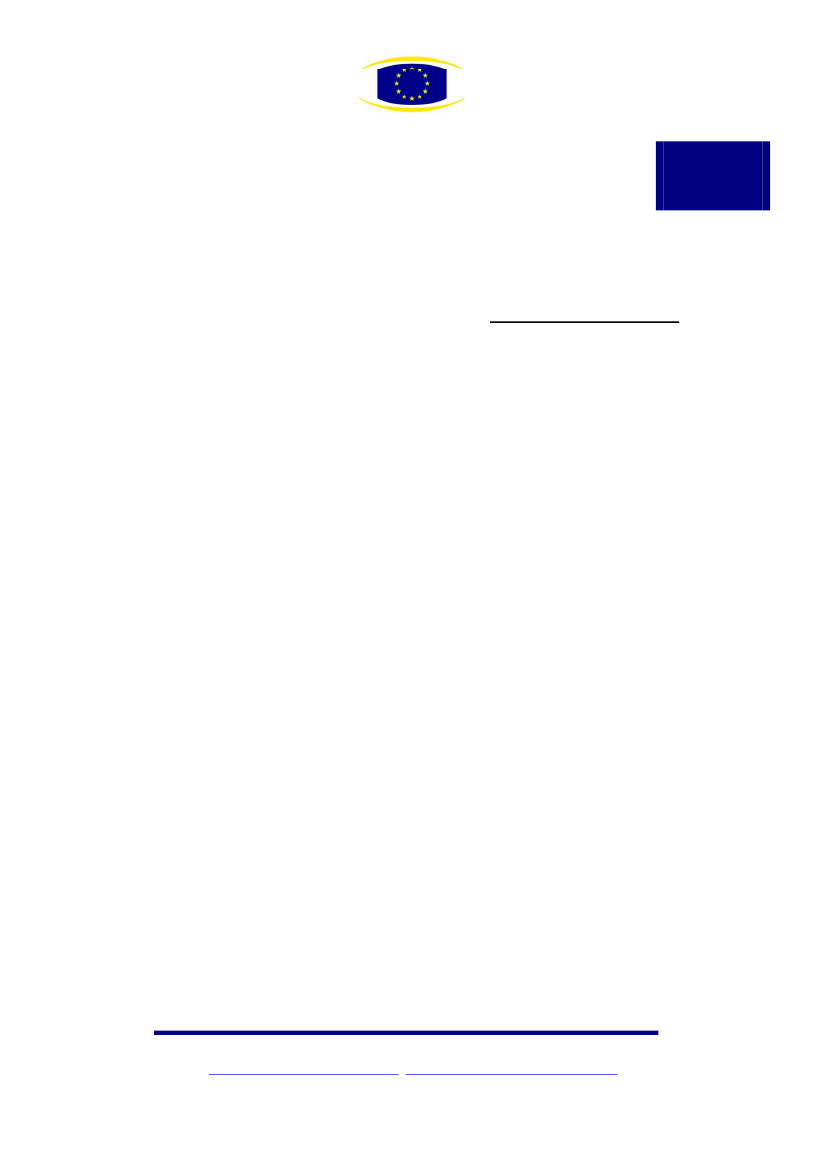Det Udenrigspolitiske Nævn 2013-14
UPN Alm.del Bilag 157
Offentligt
COU CIL OFTHE EUROPEA U IO
EN7764/14(OR. en)PROVISIO AL VERSIOPRESSE 153PR CO 17
PRESS RELEASE3304th Council meeting
Foreign AffairsBrussels, 17 March 2014PresidentCatherine AshtonHigh Representative of the Union for Foreign Affairs andSecurity Policy
PRESSRue de la Loi 175 B – 1048 BRUSSELS Tel.: +32 (0)2 281 6319 Fax: +32 (0)2 281 8026
7764/14
1
E
PROVISIO AL VERSIO
17 March 2014
Main results of the Council
UkraineThe Council focused on the situation in Ukraine. It strongly condemned the holding on 16 March ofan illegal "referendum" in Crimea on joining the Russian Federation, in clear breach of theUkrainian Constitution. The EU does not recognise the illegal “referendum” and its outcome.Catherine Ashton, EU High Representative for Foreign Affairs and Security Policy, said:"We wantto underline very clearly that there is still time to avoid a negative spiral and to reverse currentdevelopments. We call on the Russian leadership not to take steps to annex Crimea and instead totake steps to deescalate this crisis."The European Union remains ready to support facilitatingdialogue between Ukraine and Russia.In the absence of positive steps and in line with the statement of the EU Heads of State orGovernment of 6 March, the Council decided to impose travel restrictions and an asset freezeagainst 21 persons responsible for actions which undermine or threaten the territorial integrity,sovereignty and independence of Ukraine.In addition, the Council approved the modalities for signing the political provisions of theAssociation Agreement on 21 March in Brussels."This is a strong signal of our political support,"the High Representative said. The Council also confirmed the EU's commitment to proceed to thesignature and conclusions of the remaining parts of the Agreement which together with the politicalprovisions constitute a single instrument.EU strategy on the Gulf of GuineaThe Council adopted an EU strategy on the Gulf of Guinea, to support the efforts of the region andits coastal states to address the many challenges of maritime insecurity and organised crime, seepress release.
7764/14
2
E
PROVISIO AL VERSIO
17 March 2014
CO TE TS1
PARTICIPA TS................................................................................................................................ 5
ITEMS DEBATEDEastern Partnership / Ukraine .............................................................................................................. 7Bosnia and Herzegovina ...................................................................................................................... 9Middle East peace process ................................................................................................................... 9Syrian conflict and regional context .................................................................................................... 9EU-Africa summit.............................................................................................................................. 10Energy diplomacy .............................................................................................................................. 10OTHER ITEMS APPROVEDFOREIG$ AFFAIRS––––––––Gulf of Guinea strategy ......................................................................................................................................... 11EU strategy for security and development in the Sahel......................................................................................... 12South Sudan........................................................................................................................................................... 14Central African Republic....................................................................................................................................... 16Euro-Mediterranean agreements - Originating products and administrative cooperation ..................................... 18Common military list............................................................................................................................................. 18EU Special Representatives................................................................................................................................... 18Democratic Republic of the Congo - restrictive measures .................................................................................... 18
COMMO$ SECURITY A$D DEFE$SE POLICY––1
Support to the internal security forces in Mali ...................................................................................................... 19EUBAM LIBYA ................................................................................................................................................... 19
ŸWhere declarations, conclusions or resolutions have been formally adopted by the Council, this is indicatedin the heading for the item concerned and the text is placed between quotation marks.ŸDocuments for which references are given in the text are available on the Council's Internet site(http://www.consilium.europa.eu).ŸActs adopted with statements for the Council minutes which may be released to the public are indicated byan asterisk; these statements are available on the Council's Internet site or may be obtained from the PressOffice.
7764/14
3
E
PROVISIO AL VERSIODEVELOPME$T COOPERATIO$–––
17 March 2014
West Africa's Economic Partnership Agreement development programme.......................................................... 19EU common position for the first high-level meeting of the global partnership for effective developmentcooperation ............................................................................................................................................................ 19EU support for governance in the Democratic Republic of the Congo ................................................................. 19
7764/14
4
E
PROVISIO AL VERSIO
17 March 2014
PARTICIPA TS
High RepresentativeMs Catherine ASHTONBelgium:Mr Dirk WoutersBulgaria:Mr Kristian VIGENINCzech Republic:Mr Lubomir ZAORÁLEKDenmark:Mr Martin LIDEGAARDGermany:Mr Frank-Walter STEINMEIEREstonia:Mr Urmas PAETIreland:Mr Paschal DONOHOEGreece:Mr Evangelos VENIZELOSSpain:Mr José Manuel GARCÍA-MARGALLO MARFILFrance:Mr Laurent FABIUSCroatia:Ms Vesna PUSIĆItaly:Ms Federica MOGHERINICyprus:Mr Ioannis KASOULIDESLatvia:Mr Edgars RINKĒVIČSLithuania:Mr Linas A. LINKEVIČIUSLuxembourg:Mr Jean ASSELBORNHungary:Mr János MARTONYIMalta:Mr George VELLAetherlands:Mr Frans TIMMERMANSAustria:Mr Sebastian KURZPoland:Mr Radosław SIKORSKIPortugal:Mr Rui MACHETE
High Representative of the Union for Foreign Affairs andSecurity PolicyPermanent RepresentativeMinister for Foreign AffairsMinister for Foreign AffairsMinister for Foreign AffairsFederal Minister for Foreign AffairsMinister for Foreign AffairsMinister of State for European Affairs (Departments of theTaoiseach and Foreign Affairs and Trade)Deputy Prime Minister and Minister for Foreign AffairsMinister for Foreign Affairs and CooperationMinister for Foreign AffairsFirst Deputy Prime Minister and Minister for Foreign andEuropean AffairsMinister for Foreign AffairsMinister for Foreign AffairsMinister for Foreign AffairsMinister for Foreign AffairsMinister for Foreign AffairsMinister for Foreign AffairsMinister for Foreign AffairsMinister for Foreign AffairsFederal Minister for European and International AffairsMinister for Foreign AffairsMinistro de Estado, Minister for Foreign Affairs
7764/14
5
E
PROVISIO AL VERSIORomania:Mr Titus CORLĂȚEANSlovenia:Mr Karl ERJAVECSlovakia:Mr Miroslav LAJČÁKFinland:Mr Erkki TUOMIOJASweden:Mr Carl BILDTUnited Kingdom:Mr William HAGUEMinister for Foreign Affairs
17 March 2014
Deputy Prime Minister, Minister for Foreign AffairsDeputy Prime Minister, Minister for Foreign AffairsMinister for Foreign AffairsMinister for Foreign AffairsFirst Secretary of State, Secretary of State for Foreign andCommonwealth Affairs
Commission:Mr Günther OETTINGERMr Štefan FÜLE
MemberMember
7764/14
6
E
PROVISIO AL VERSIOITEMS DEBATEDEastern Partnership / Ukraine
17 March 2014
The Council held an in-depth discussion on the situation in Ukraine. It adopted the followingconclusions:1."The Council strongly condemns the holding of an illegal referendum in Crimea on joiningthe Russian Federation on 16 March, in clear breach of the Ukrainian Constitution. The EUdoes not recognise the illegal “referendum” and its outcome. It also takes note of the draftopinion of the Venice Commission on this “referendum”. It was held in the visible presenceof armed soldiers under conditions of intimidation of civic activists and journalists, blackingout of Ukrainian television channels and obstruction of civilian traffic in and out of Crimea.Furthermore, there have been clear signs of increasing Russian military build-up in Crimea aswell as denial of access to the peninsula to UN and OSCE representatives and missionsinvited by the government of Ukraine. The EU deplores these further negative developments,which are in clear violation of Ukraine's sovereignty and territorial integrity.The Council recalls the statement of the EU Heads of State and Government of 6 Marchwhich set out that negotiations between Ukraine and Russia needed to start within a few days,including through multilateral mechanisms, and produce results within a limited timeframe. Inlight of the developments of last week, and in the absence of any such results, the Council hasdecided to introduce additional measures, including travel restrictions and an asset freezeagainst persons responsible for actions which undermine or threaten the territorial integrity,sovereignty and independence of Ukraine, including actions on the future status of any part ofthe territory which are contrary to the Ukrainian Constitution, and persons, and entitiesassociated with them.The European Union remains ready to support facilitating dialogue between Ukraine andRussia. We urge Russia to take steps to de-escalate the crisis, immediately withdraw its forcesback to their pre-crisis numbers and garrisons in line with its international commitments,begin direct discussions with the government of Ukraine and avail itself of all relevantinternational mechanisms to find a peaceful and negotiated solution, in full respect of itsbilateral and multilateral commitments to respect Ukraine's sovereignty and territorialintegrity. In this respect, the EU regrets that the UNSC was not able to adopt a resolution,owing to a veto by the Russian Federation.There is still time to reverse current developments. Opportunities exist to avoid a negativespiral. The EU is ready for a constructive dialogue with all sides. The EU remains committedto the objective of developing the EU-Russia relationship, based on mutual interest andrespect for international law. The Council regrets that Russia’s actions contradict theseobjectives. The Council urges the Russian Federation not to take steps to annex Crimea inviolation of international law.
2.
3.
4.
7764/14
7
E
PROVISIO AL VERSIO
17 March 2014
Any further steps by the Russian Federation to destabilise the situation in Ukraine would leadto additional and far-reaching consequences for relations in a broad range of economic areasbetween the European Union and its Member States, on the one hand, and the RussianFederation, on the other hand. The European Union calls on Russia to return to developing astrategic partnership with the EU instead of isolating itself further diplomatically andeconomically.5.The Council considers that there is an urgent need for an international presence on the groundthroughout Ukraine, including in Crimea. The Council supports the swift deployment of anOSCE Special Monitoring Mission to Ukraine.The Council welcomes the Commission's proposal for temporarily removing customs dutieson Ukrainian exports to the EU and looks forward to its swift adoption. It furthermore looksforward to the signing of the political provisions of the Association Agreement on 21 Marchin Brussels and confirms its commitment to proceed to the signature and conclusion of theremaining parts of the Agreement which together with the political provisions constitute asingle instrument. These steps will confirm Ukraine's free and sovereign decision to pursueUkraine's political association and economic integration with the European Union.The European Union is ready to stand by Ukraine and committed to provide strong financialsupport to its economic and financial stabilisation, as presented by the European Commissionin its assistance package to Ukraine which we are committed to implement rapidly. TheCouncil encourages the EIB to continue its operations in Ukraine. IMF support will be criticalto enabling assistance from the European Union as the immediate priority is to restoremacroeconomic stability through sound fiscal, monetary and exchange rate policies. At thesame time, we reiterate our call on the Ukrainian government to launch urgently an ambitiousset of structural reforms, including notably the fight against corruption and enhancingtransparency of fiscal expenditure.The EU also confirmed its readiness to continue to assist Ukraine in securing its energysupply through further diversification, enhanced energy efficiency, and effectiveinterconnections with the European Union.
6.
7.
8.
7764/14
8
E
PROVISIO AL VERSIO9.
17 March 2014
The European Union commends the measured response shown so far by Ukraine. The EUagain encourages the Ukrainian authorities to implement an inclusive process, to pursue theirefforts to ensure free and fair elections and to advance constitutional reform. All human rightsviolations and acts of violence need to be properly investigated and measures need to bestepped up to combat impunity. In this context, the EU looks forward to the earlyestablishment of the Council of Europe International Advisory Panel. The EU also calls on theUkrainian authorities to continue to reach out to all Ukrainian regions and population groupsand to ensure the full protection of the rights of persons belonging to national minorities,drawing on the expertise of the Council of Europe and the OSCE. It also supports the Councilof Europe tasking of its Advisory Committee for the Framework Convention for theProtection of National Minorities to review the situation of national minorities in Ukraine.The Council reiterates the EU's commitment to enhance people-to-people contacts betweenthe citizens of the European Union and Ukraine, i.e. through the visa liberalisation process, inline with agreed conditions in the framework of the Visa Liberalisation Action Plan."
10.
The Council also adopted restrictive measures in response to actions threatening the territorialintegrity of Ukraine, seepress release.In addition, the Council approved a decision on the signing and provisional application of theAssociation Agreement with Ukraine as well as a final act concerning this agreement.Bosnia and HerzegovinaThe High Representative reported to ministers about her recent trip to Sarajevo where she discussedthe situation with politicians and members of civil society.Middle East peace processThe High Representative briefed ministers on possible steps to support the on-going efforts on theMiddle East peace process.Syrian conflict and regional contextThe High Representative briefly updated ministers on the latest developments in the Syrian conflict.
7764/14
9
E
PROVISIO AL VERSIO
17 March 2014
EU-Africa summitThe Council was briefed about preparations for the 4th EU-Africa summit, which is to take place inBrussels on 2-3 April under the theme "Investing in people, prosperity and peace".Energy diplomacyOver lunch, ministers exchanged views on EU energy diplomacy, in the presence of EnergyCommissioner Günther Oettinger. Ministers discussed the foreign policy implications of strategicchoices made in the field of energy by relevant partners.The shift in the global energy landscape creates new challenges and opportunities for EU foreignand security policy. The shale gas revolution in the US, the growing demand for energy in India dueto its increasing population and the rise of gas as a source in China might have far-reaching politicaland economic consequences.
7764/14
10
E
PROVISIO AL VERSIOOTHER ITEMS APPROVEDFOREIG AFFAIRSGulf of Guinea strategyThe Council adopted the following conclusions on the Gulf of Guinea:"1.
17 March 2014
Recognising the importance of its relations with West and Central Africa, the Council hastoday adopted a Strategy on the Gulf of Guinea, drawing on a Joint Communication1of theCommission and the High Representative, to support the efforts of the region and its coastalstates to address the many challenges of maritime insecurity and organised crime. Theadoption of a strategy on the Gulf of Guinea underlines, in a timely manner ahead of the EU-Africa Summit in April 2014, the importance which the EU attaches to close andcomprehensive cooperation with its African partners.The EU's comprehensive approach to West and Central Africa is based on the region's geo-strategic importance and the EU's long-standing determination to support its efforts toovercome poverty and attain lasting stability and prosperity. Piracy, Armed Robbery At Sea,Illegal, Unreported and Unregulated fishing (IUU) including environmental degradation andchallenges to food security and organised crime including smuggling of migrants andtrafficking of human beings, drugs and arms in the Gulf of Guinea pose serious challenges tohuman security and human rights, economic activity and trade both at sea and on land.Furthermore, links to transnational organised criminal and terrorist networks threaten stabilityin the wider sub-region and impact the security of Europe and its citizens.The EU Strategy builds upon the momentum which was created by the Heads of State of theregion at their Summit in Yaoundé, Cameroon in June 2013, and aims to provide the supportof the EU particularly to the efforts of the Economic Community of West African States(ECOWAS), the Economic Community of Central African States (ECCAS) and the Gulf ofGuinea Commission (GGC). This regional ownership is essential to achieve lasting peace,security, justice and good governance based on the democratic principles of inclusion, the ruleof law and respect for human rights. The Strategy also recognises the need to protect both thepopulations in the Gulf of Guinea region and European citizens from the threats that emanatefrom the region, including piracy, terrorism, smuggling of migrants and trafficking of humanbeings, drugs, and arms.
2.
3.
1
doc. 18099/13.11
7764/14
E
PROVISIO AL VERSIO4.
17 March 2014
The EU recognises the importance of addressing the underlying causes and contributingfactors, including poverty and weak governance. Although circumstances vary from region toregion, the EU's experience in dealing with insecurity in the Horn of Africa, the Sahel, and theGreat Lakes, indicates the appropriateness and effectiveness of preventive action in closecoordination with other international partners and in support of the efforts of the countries ofthe region and African regional bodies. It particularly shows the value of integrating all EUmeans and instruments - political, security, sustainable development and fisheries, goodgovernance and anti-corruption - in a comprehensive approach for greater impact.The EU will advance work to seek to enhance the capacity of the regional organisations andcoastal states to build a common understanding of the threats, strengthen their institutions toensure security and the rule of law, human rights, and accelerate development including jobcreation, and build cooperation structures to take the necessary actions at sea and on land.This strategic approach should also increase the level of coordination among the EU and itsMember States in the region.The Strategy, in Annex, sets out the EU's strategic approach, in partnership with the regionitself and in close cooperation with key international partners. The Council invites the EEASand the Commission in consultation with Member States to develop an Action Plan to deliverthe Strategy, in synergy with the future EU Maritime Security Strategy and mindful of theprinciples of the EU comprehensive approach, and to report back annually on progress withits implementation. It also invites the High Representative to appoint a Senior Coordinator forthe Gulf of Guinea who will oversee the implementation of the Strategy and its Action Plan."
5.
6.
To read the full EU strategy for the Gulf of Guinea,see here.EU strategy for security and development in the SahelThe Council adopted the following conclusions on the implementation of the EU strategy forsecurity and development in the Sahel:"1.The European Union (EU) remains deeply concerned by the crisis in the Sahel region. Itreiterates its determination to support partners in addressing the region's key security anddevelopment challenges.
7764/14
12
E
PROVISIO AL VERSIO2.
17 March 2014
The Council welcomes the progress made in implementing the EU Strategy for Security andDevelopment in the Sahel and encourages its enhanced implementation in coordination withthe EU Special Representative (EUSR) for the Sahel. The objectives of the EU Strategy in thefields of security, peace-building, conflict prevention, countering radicalisation anddevelopment remain valid and the link between security and development will remain at theheart of EU policies and operations in the region. Responding in a dynamic manner to theevolution of the situation in the region is key to ensure the efficacy of the EU comprehensiveapproach. In this context, the Council invites the EEAS, the EUSR for the Sahel and theCommission to develop a new regional action plan covering the next steps of implementationof the Sahel Strategy.The Council invites the EEAS, the EUSR for the Sahel and the Commission to extend theimplementation of the Strategy to Burkina Faso and Chad while intensifying relevantactivities in Mali, Mauritania and Niger. Political dialogue on conflict prevention and securityissues in the Sahel region will be stepped up also in relevant West African and neighbouringcountries including Senegal, Nigeria and Cameroon as well as countries of the Maghreb.International support to the Sahel region needs to be accompanied by sustained efforts to finda lasting solution to the roots of the ongoing crises in the north of Mali and the wider region.Security and development in the Sahel region is also strongly linked to stability in Libya. InMali, the EU fully supports the work of the United Nations stabilisation mission MINUSMAto help create conditions conducive to the full restoration of State authority, order and securityin the north of Mali. The EU strongly urges all Malian parties to begin credible and inclusiveconsultations open to all communities and to all non-terrorist armed groups of northern Maliwith the aim of achieving broadly founded and lasting peace through a sustainable politicalsolution. The EU will also continue to support the implementation of the plan for thesustainable recovery of Mali.In line with the humanitarian principles of independence, neutrality, impartiality andhumanity, the EU will also continue to provide humanitarian aid to the most vulnerablepeople, on the basis of needs, especially this coming months to ensure a coordinated andeffective response to the current food crisis in the Sahel region and to link relief,rehabilitation, and development wherever conditions allow it. In that perspective, the EU willcontinue to foster resilience building and relevant coordination efforts by Western Africaregional organisations and partners in the framework of the Global Alliance for ResilienceInitiative (AGIR).
3.
4.
5.
7764/14
13
E
PROVISIO AL VERSIO6.
17 March 2014
With regard to development in the Sahel, the EU will continue to support sustainable andinclusive socio-economic development and regional integration, drawing lessons from thepast. The Council commends the progress made towards the implementation of an EconomicPartnership Agreement between the EU and West Africa. The EU will provide specificsupport to regional infrastructures that bring the periphery closer to the centre, sustainablesocial services especially health and education, and sustainable agriculture, food and nutritionsecurity. The EU will encourage in particular local and national development policiesaddressing the specific socioeconomic and human security needs of border areas as a way toimprove territorial control and state authority throughout territories. Due attention will be paidto trading, trafficking and migratory flows including return and readmission and the synergiesbetween migration and development. The EU will continue to promote democracy, humanrights, decentralisation policies, good governance including an independent and fair justicesystem at local and regional levels, and it will encourage the fight against corruption as wellas counter-radicalisation projects as a means of conflict prevention, building on local andnational initiatives where possible. The EU will continue to implement joint programmingwithin the Sahel countries in order to further increase the effectiveness of EU developmentcooperation.In the field of security, the EU will continue to provide support to national and regionalendeavours related to security sector reform and integrated border management and tonational efforts in the fight against terrorism and organised crime, including smuggling ofmigrants and trafficking of human beings, notably through the ongoing CSDP missions inLibya, Mali and Niger as well as the future civilian mission in Mali. The EU will promotesynergies between those missions while integrating lessons learnt from previous missions.The EU welcomes the efforts of the African Union and other regional actors to promoteenhanced coordination in the field of intelligence and counter-terrorism as well as optimalallocation of national assets and capacities."
7.
South SudanThe Council adopted the following conclusions on South Sudan:"1.The European Union (EU) expresses its deep concern about the ongoing crisis in SouthSudan, the grave human suffering it causes and its regional implications. It is seriouslyconcerned about the violations of the Cessation of Hostilities (CoH) agreement signed on23 January 2014 in Addis Ababa and calls on all parties to immediately stop the violence andhonour the CoH. It urges all political and military leaders to protect the people of South Sudanand to act in the interest of the South Sudanese population as whole. The EU supports effortsto operationalize the agreed Monitoring and Verification Mechanism (MVM) and calls on allactors involved to expedite this process. The EU recognises the essential role that the UnitedNations Mission in South Sudan (UNMISS) is playing in protecting civilians and monitoringand reporting on human rights. The EU condemns all threats against the Mission's personneland calls upon all parties to cooperate fully with UNMISS.
7764/14
14
E
PROVISIO AL VERSIO2.
17 March 2014
The EU firmly supports the mediation led by the Inter-Governmental Authority forDevelopment (IGAD) and commends IGAD's relentless efforts to open the way for aninclusive political dialogue. In this regard the EU welcomes the release of seven detainedpolitical leaders and their involvement in the peace process, and calls on the Government ofSouth Sudan to take the necessary measures to release the four remaining detainees and allowthem to take part in this process too. The EU looks forward to the resumption of talks inAddis Ababa on 20 March 2014. In this context, it urges all parties to negotiate in good faithtowards a peaceful, comprehensive and sustainable solution to rapidly put an end to thisconflict by addressing its underlying causes. The EU stresses the importance of inclusivedialogue and national reconciliation and underlines the role of civil society in this respect.The EU has provided support for the IGAD-led negotiations and stands ready to support theireventual outcome. The EU invites the EU Special Representative for the Horn of Africa toremain actively engaged in addressing this crisis in coordination with the "Troika" and otherinternational actors.The EU expresses concerns about any external intervention that could exacerbate the politicaland military tensions in South Sudan. It recalls the engagement of the parties to redeploy orprogressively withdraw allied forces invited by either side. The EU encourages regionalleaders to continue their cooperation under the aegis of IGAD.The EU is deeply concerned at ongoing reports of widespread human rights violations andother abuses as also documented in an interim report by UNMISS issued on 21 February2014. The EU welcomes further investigations by the UN into the role of different actors ininstigating and committing the gross violations documented in the report: extrajudicial andmass killings; the deliberate targeting of civilians, arbitrary arrests and detention; enforceddisappearances; ill-treatment and torture; recruitment and use of children; sexual violence;and widespread looting and destruction of property. The EU welcomes the establishment ofthe African Union Commission of Inquiry on 7 March 2014. It urges the Commission to beginits work as soon as possible and to cooperate with the UN and other relevant actors includingin establishing the immediate and root causes of the conflict, in investigating crimescommitted and proposing accountability and reconciliation measures. All those responsiblefor violations of international humanitarian law and international human rights law must beheld accountable.
3.
4.
7764/14
15
E
PROVISIO AL VERSIO5.
17 March 2014
The EU is alarmed by the increasingly desperate humanitarian situation, including asignificant risk of famine. Since the outbreak of the conflict in mid-December 2013, morethan 900 000 have been forced from their homes. Around 3.7 million people are severely foodinsecure. The EU welcomes the role of the UN in coordinating the humanitarian response. Iturges all partners to contribute both generously and swiftly to the South Sudan CrisisResponse Plan and in particular to align their efforts to address the increasing food insecurityand to strengthen the resilience of the population. The EU and its Member States have so farpledged support to the tune of € 110 million. The EU condemns continued restrictions onhumanitarian activities and calls on all parties to allow rapid, full, safe and unhinderedhumanitarian access to all populations in need, in accordance with international humanitarianlaw and principles.The EU reiterates that it stands ready to consider targeted restrictive measures againstindividuals obstructing the political process, in support of AU and IGAD efforts and in closecoordination with international partners."
6.
Central African RepublicThe Council adopted the following conclusions on the Central African Republic:"1.The security and humanitarian crisis in the Central African Republic (CAR) remains a matterof deep concern, despite the relative stabilisation of the situation in Bangui and in the areas inwhich the international forces are deployed. The European Union (EU) reaffirms the concernsit expressed in previous Council conclusions on 20 January and 10 February 2014. It remainsconcerned about the risk of the Central African conflict having an effect on the neighbouringcountries and calls for the integrity of the country to be respected. The EU intends to maintainits mobilisation, in coordination and cooperation with other international actors, in relation toall dimensions of the crisis, within the framework of an overall approach comprising actionsin the humanitarian (respecting the principles of humanitarian action), political andstabilisation spheres and actions to promote development.The EU remains extremely concerned about the humanitarian impact of the crisis in theCentral African Republic, which persists despite the regional and international effortsdeployed on the ground. The survival conditions of the population remain precarious,particularly in the interior of the country where humanitarian access remains difficult. The EUis particularly concerned about the security threats to the civil population and about theconsequences, in particular humanitarian, of mass forced departures of Central Africans andmigrants, in particular Muslims, mainly towards Chad, Cameroon, the Democratic Republicof the Congo and the Republic of the Congo. The EU reaffirms its commitment to the CARand calls on the international community to increase its funding for the populations affectedby the crisis, both within the CAR and in the neighbouring countries.
2.
7764/14
16
E
PROVISIO AL VERSIO3.
17 March 2014
The EU encourages the Central African transitional authorities to continue the politicaltransition process and carry on with the preparation of elections. In particular, it urges theauthorities to focus their efforts on combating impunity and recalls that the perpetrators ofviolations must answer for their crimes in court. The EU welcomes the decision of theProsecutor of the International Criminal Court to initiate a preliminary examination of thesituation in the CAR, which is a party to the Rome Statute, as well as the work of theInternational Commission of Inquiry established by United Nations Security CouncilResolution 2127 (2013). The EU calls on the transitional authorities to continue their effortsto restore the rule of law. To achieve that objective, it is essential to restore security,re-establish the administration and introduce rules for economic good governance; interfaithdialogue and inter-community mediation are also vital. The EU reiterates its commitment toaccompany the transitional authorities along this path, in cooperation with other internationalpartners. It welcomes in particular the commitment to stabilising the country made by theAfrican Union and neighbouring countries at the military, humanitarian, political andfinancial levels.Following the adoption of the Decision of the Council of the European Union of10 February 2014 authorising the establishment of the CSDP military operation EUFOR RCAas laid down in United Nations Security Council Resolution 2134, the Council approves theOperations Plan and the Rules of Engagement. The Council stresses the need to speed upwork on the preparation of the CSDP-EUFOR CAR operation so that it can be launchedquickly in accordance with the commitments undertaken by the European Union.By providing temporary support for a maximum period of six months, this transitionalmilitary operation will contribute to providing a secure environment in the Bangui district,with a view to handing over to MISCA, the African Union operation, or to a UNpeacekeeping mission.The EU welcomes the report by the United Nations Secretary-General of 3 March 2014(S/2014/142), notably the recommendation to authorise as soon as possible the deployment ofa United Nations peacekeeping operation, following a request to that end from the CentralAfrican authorities, the aim being, in particular, to enhance the protection of the civilianpopulation, to accompany the transition process, including the holding of elections byFebruary 2015 at the latest, to support the protection of human rights and internationalhumanitarian rights and the fight against impunity and to contribute to restoring the essentialfunctions of the State. The EU underlines the importance of maintaining financial andlogistical support for MISCA until the possible deployment of a United Nations mission. Inthis context, it reaffirms its commitment, financial and otherwise, to MISCA and calls for theurgent mobilisation of the resources announced at the donors' conference to support MISCA,organised by the African Union on 1 February 2014.
4.
5.
6.
7764/14
17
E
PROVISIO AL VERSIO7.
17 March 2014
The EU recalls its commitment to examine the conditions for a future engagement in the areaof the rule of law and security sector reform. In this regard, it invites the High Representativeto consider the different options that might be implemented in the area of security sectorreform.The Council takes note of the Commission's intention to provide the CAR with aid exceedingEUR 100 million, in particular for the restoration of the State and the re-establishment ofsocial services (education, health and food security/nutrition) and the preparation ofelections."
8.
In addition, the Council approved the operation plan for the EU military operation in the CentralAfrican Republic (EUFOR RCA).Euro-Mediterranean agreements - Originating products and administrative cooperationThe Council adopted a decision establishing the position to be taken by the EU within theAssociation Councils established under its association agreements with various Mediterraneanpartners on the amendment of a specific protocol to each agreement as concerns the concept of"originating products" and methods of administrative cooperation.The decision concerns the Euro-Mediterranean association agreements with Algeria, Egypt, Jordan,Morocco, the Palestinian Authority and Tunisia.Common military listThe Council updated the EU's common military list, which defines the scope of EU rules on armsexports as set out in Common Position 2008/944/CFSP defining common rules governing thecontrol of exports of military technology and equipment.EU Special RepresentativesThe Council approved revised guidelines on the appointment, mandate and financing of EU SpecialRepresentatives. The guidelines were updated and developed to take account of the Lisbon Treaty.Democratic Republic of the Congo - restrictive measuresThe Council amended the restrictive measures against the Democratic Republic of the Congo so asto implement changes decided in UN Security Council resolution 2136 (2014) of 30 January 2014.
7764/14
18
E
PROVISIO AL VERSIOCOMMO SECURITY A D DEFE SE POLICYSupport to the internal security forces in Mali
17 March 2014
The Council adopted a crisis management concept for a civilian mission under the CommonSecurity and Defence Policy to assist the internal security forces in Mali (EUCAP Mali) so as toenable the Malian state to ensure law and order and fight against terrorists, organised crime andcross-border trafficking. Once established, EUCAP Mali would deliver strategic advice and trainingfor managers of the three internal security forces in Mali, i.e. police,GendarmerieandGardenationale.EUBAM LIBYAThe Council authorised the opening of negotiations for an agreement on the participation of theSwiss Confederation in the EU integrated border management assistance mission in Libya(EUBAM LIBYA).DEVELOPME T COOPERATIOWest Africa's Economic Partnership Agreement development programmeThe Council approved conclusions on West Africa's Economic Partnership AgreementDevelopment programme, as set out in7028/14.EU common position for the first high-level meeting of the global partnership for effectivedevelopment cooperationThe Council adopted the conclusions on the EU common position for the first high-level meeting ofthe global partnership for effective development cooperation, which will take place in Mexico Cityon 15/16 April 2014, as set out inhere.EU support for governance in the Democratic Republic of the CongoThe Council adopted conclusions on the European Court of Auditors' special report No. 9/2013 onEU support for governance in the Democratic Republic of the Congo, as set out in7099/14.
7764/14
19
E



















